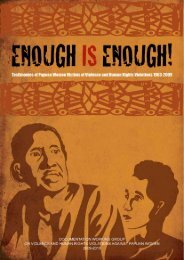The Impact of Armed Conflict on Women and Girls - UNFPA
The Impact of Armed Conflict on Women and Girls - UNFPA
The Impact of Armed Conflict on Women and Girls - UNFPA
You also want an ePaper? Increase the reach of your titles
YUMPU automatically turns print PDFs into web optimized ePapers that Google loves.
A major premise <str<strong>on</strong>g>of</str<strong>on</strong>g> gender-difference theory based <strong>on</strong> comm<strong>on</strong> feminist<br />
thought is that men are exclusively aggressive <strong>and</strong> violent, whereas women are<br />
docile <strong>and</strong> peaceful. <str<strong>on</strong>g>The</str<strong>on</strong>g> general view <str<strong>on</strong>g>of</str<strong>on</strong>g> women’s being against war, however,<br />
has been challenged many times. 12 <str<strong>on</strong>g>The</str<strong>on</strong>g> c<strong>on</strong>flicts in the Balkan regi<strong>on</strong> have<br />
shown that several women supported the war, but did so differently from their<br />
partners who were directly involved in the c<strong>on</strong>flict. In 1991, the image <str<strong>on</strong>g>of</str<strong>on</strong>g> the<br />
Serbian women cheering <strong>and</strong> waving to their husb<strong>and</strong>s, s<strong>on</strong>s, brothers <strong>and</strong><br />
fathers going to fight in Croatia is a powerful, persistent image in comm<strong>on</strong><br />
memories <str<strong>on</strong>g>of</str<strong>on</strong>g> the war. Another memorable image, however, involves Serbian<br />
women who protested the war at Belgrade’s main square.<br />
<str<strong>on</strong>g>The</str<strong>on</strong>g>re are also several challenges to the view that men are exclusively<br />
pro-c<strong>on</strong>flict. Historically, male soldiers have had the most to lose in c<strong>on</strong>flicts.<br />
However, those who fail to live up to social expectati<strong>on</strong>s <str<strong>on</strong>g>of</str<strong>on</strong>g> bravery are frequently<br />
stigmatized <strong>and</strong> severely punished by both men <strong>and</strong> women. 13 During c<strong>on</strong>flicts<br />
in the Balkan regi<strong>on</strong>, many men, particularly young men, left their countries to<br />
avoid fighting. <str<strong>on</strong>g>The</str<strong>on</strong>g>se men still bear severe punishment for c<strong>on</strong>tributing to the<br />
c<strong>on</strong>flict. In Serbia, men who defect are proclaimed ethnic traitors, which is the<br />
most serious stigma in Serbian culture. In Bosnia <strong>and</strong> Herzegovina, these men<br />
are <str<strong>on</strong>g>of</str<strong>on</strong>g>ten blacklisted, resulting in difficulty finding jobs <strong>and</strong> open verbal abuse.<br />
<strong>Women</strong> are less inclined to participate in c<strong>on</strong>flict <strong>and</strong> violence because<br />
they are excluded from political <strong>and</strong> social life <strong>and</strong> decisi<strong>on</strong>-making, <strong>and</strong> depend<br />
ec<strong>on</strong>omically <strong>on</strong> men. 14 <strong>Women</strong> c<strong>on</strong>tinue to be aligned with family care <strong>and</strong><br />
social assistance resp<strong>on</strong>sibilities. As a result, women dominated assistance<br />
work during the c<strong>on</strong>flict, which marked the beginning <str<strong>on</strong>g>of</str<strong>on</strong>g> civil societies in the<br />
Balkans.<br />
<str<strong>on</strong>g>The</str<strong>on</strong>g> scope <str<strong>on</strong>g>of</str<strong>on</strong>g> violence in war is drastic <strong>and</strong> sometimes bey<strong>on</strong>d<br />
comprehensi<strong>on</strong>. It is a force, however, that triggers str<strong>on</strong>g resp<strong>on</strong>se in unifying<br />
<strong>and</strong> organizing those against violence. NGO activities that research <strong>and</strong> address<br />
violence have developed different methods to deal with post-c<strong>on</strong>flict regi<strong>on</strong>s. In<br />
1992, the world media news about mass rape <str<strong>on</strong>g>of</str<strong>on</strong>g> Muslim <strong>and</strong> other women in<br />
Bosnia <strong>and</strong> Herzegovina resulted in vast initiatives, particularly for women, to<br />
assist victims <str<strong>on</strong>g>of</str<strong>on</strong>g> rape <strong>and</strong> torture in the camps. In this c<strong>on</strong>text, many NGOs<br />
encountered a wider range <str<strong>on</strong>g>of</str<strong>on</strong>g> violence against women, not just rape. Some<br />
violence was c<strong>on</strong>nected to the war, specifically, traumatized men; some was<br />
previously existing violence in the family; <strong>and</strong> some c<strong>on</strong>stituted new types <str<strong>on</strong>g>of</str<strong>on</strong>g><br />
violence caused by the horrific, unpredictable circumstances <str<strong>on</strong>g>of</str<strong>on</strong>g> war <strong>and</strong><br />
displacement. <str<strong>on</strong>g>The</str<strong>on</strong>g> ways in which post-war violence <strong>and</strong> l<strong>on</strong>g-st<strong>and</strong>ing domestic<br />
12 Byrne, Gender, p. 20.<br />
13 Ibid.<br />
14 A. Weir, Sacrificial Logics: Feminist <str<strong>on</strong>g>The</str<strong>on</strong>g>ory <strong>and</strong> the Critique <str<strong>on</strong>g>of</str<strong>on</strong>g> Identity (New York/L<strong>on</strong>d<strong>on</strong>:<br />
Routledge, 1996).<br />
65




![IANSA [PDF, 2MB] - PeaceWomen](https://img.yumpu.com/25206379/1/190x123/iansa-pdf-2mb-peacewomen.jpg?quality=85)
![Commitments Sample [PDF, 93KB] - PeaceWomen](https://img.yumpu.com/25206331/1/190x245/commitments-sample-pdf-93kb-peacewomen.jpg?quality=85)










![A Toolkit for Advocacy and Action [PDF, 260KB] - Peace Women](https://img.yumpu.com/25205989/1/190x245/a-toolkit-for-advocacy-and-action-pdf-260kb-peace-women.jpg?quality=85)